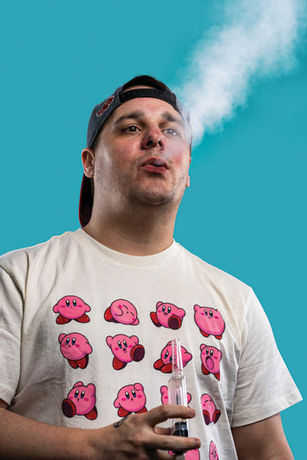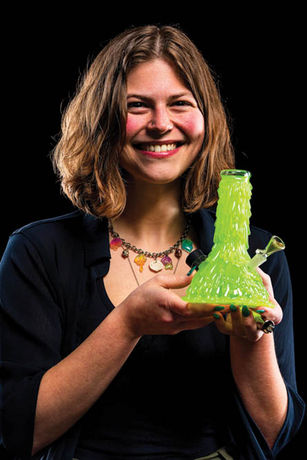It’s said that if you love what you do, you’ll never work a day in your whole life. That type of high-minded aphorism appears to have been written for this chapter of Nicholas Farrell’s life.
A 38-year-old native of Buffalo, New York, Nicholas was medically retired from the Navy in September 2018 after an 11-year career as a helicopter mechanic. Upon discharge, Nicholas suffered from a variety of ailments – none more debilitating than the nerve damage that accrued in his left knee over a decade of rigorous labor.
“Working in a helicopter, you’re often in these very small spaces,” said Nicholas, who served at the Naval Air Station Patuxent River in St. Mary’s County from 2014-18. “Now I’m 6-foot-2. A bigger guy like me, working in these cramped areas, it wears on you over time.”
In March of 2016, Nicholas’s knee gave out after a day of service. He needed help from his wife, Jenae, just to climb the stairs to get into the house. When physical therapy didn’t lessen the pain nor improve his mobility, Nicholas was referred to specialists who informed him that the injury was worse than they initially thought.
“They said, ‘The tendons in your knee are essentially ripped to shreds, and the nerves are damaged to a point where there’s not a whole lot we can do,’” Nicholas recalled.
Unable to perform his duties, Nicholas was put on administrative duty and began contemplating his next career move. The Navy had been good to him, allowing him to tour all of Asia – a childhood dream come true. The armed services had provided discipline and stability, as well as a brotherhood.
“I had good benefits, good pay, and I was traveling around the world,” he said. “I was enjoying life at that point.”
But it also had its drawbacks.
In 2011, Nicholas was stationed on the USS Shiloh – the only ballistic missile defense ship in Asia at the time. Ship-wide anxiety could be stirred up in a moment’s notice if North Korea chose to conduct a missile test, which was a frequent occurrence during his five-year tour in the region.
He was also part of a humanitarian search and rescue operation in the aftermath of the 2011 Tōhoku earthquake (9.1 on the Richter scale), where more than 15,000 people were left dead in its wake.
“I saw a lot of stuff that was really difficult to see,” said Nicholas, who lost one of his best friends – a Japanese native. “I never saw my friend or his family again. I know it’s sad to say, but when you’re in the Navy, it’s easier to compartmentalize those kinds of things. You’re always just so busy.”
Immobilization forced Nicholas to slow down and reflect on what he had encountered during his service. No longer capable of immersing himself in a job he enjoyed, his mental health suffered, choosing to numb his pain with alcohol.
“I was diagnosed with PTSD, depression and anxiety,” Nicholas said.
He actively sought out a medical release from the Navy and it was granted in 2018.
“That first year out of the Navy was my low point,” he said. “I’m sitting there with permanent nerve damage in my leg and all this mental stuff is starting to catch up with me. I needed to do something. I needed to figure it out.”
Returning to civilian life, Nicholas moved back to Cumberland, Maryland – a city where Jenae’s family is from.
“I was just kind of learning how to function again in a regular society,” Nicholas said. “I started finding myself again. And I stopped using all of the medications the military had me on – nerve blockers, pain killers, etc.”
Nicholas swore off the booze and turned to Cannabis, obtaining a medical card and smoking for the first time in 11 years. He found his mind clearing up, exclaiming he “no longer held onto things for long periods of time.” His mood started picking up, as did his creativity. Nicholas began expressing himself through art, painting and taking after his mother, a photographer.
“I started doing photography when I was in high school,” he said. “My mom was a pretty good photographer, so I’d always see her pictures around the house.”
Nicholas found that an infusion of Cannabis into honey (that he would have with his morning tea) improved his mobility, which in turn helped take his photography further. In his first year of finding a stable dosage, Nicholas estimates he regained 80 percent of his mobility.
“Walking around with a cane when you’re 34-years-old is not where anybody wants to be in life,” he said. “But the honey worked. I thought, ‘All right, I can do this. I can function. I don’t need this cane.’”
In February of 2020, he was hired by Grow West Cannabis, getting his start with the harvest and trim department. Shortly thereafter, he was promoted to cultivation, which put his photography skills to use. The company has since created a position that places Nicholas as a staff photographer, videographer, content creator and marketer – a role he has treasured for the past year.
“I’ve always been an artistic person,” he said. “Growing up in Buffalo in the ‘90s early 2000s, me and my friends used to grow our own weed. Even back then, I would buy little disposable cams, take pics of the bud and hoped that nobody at CVS cared when we got them developed. That’s where my two loves of Cannabis and photography first combined.”
Nicholas no longer uses a disposable.
Grow West has armed their military veteran with a Sony a7 III Full-Frame Mirrorless camera, accompanied by a pair of high-functioning G series lenses.
“The crisp quality of photos you can get with full frame and 4k is crazy,” he said.
Nicholas is often presented with new strains, encouraged to accentuate the trichomes of Grow West’s bud in a stunning visual presentation – a challenge he rises to meet daily.
“I can’t believe I get to do this and get paid for a living,” he laughed, shaking his head in disbelief.
After all, it wasn’t until he was in his early 20s that Nicholas wanted to travel to Asia and see more of the world that he sought after a career in the Navy. Before that, he says he was just a kid who enjoyed smoking and admiring glamour shots in High Times Magazine of Cannabis being served legally across the country. Now, he’s taking the photos of Cannabis that is legally grown in his residential state, while using the product to help overcome a handicap. For that, he says he’ll be paying it forward forever.
“I love the plant,” he said. “It has done miracles for me, mentally and physically. And I have a lot of veteran friends who use and have completely turned their lives around as well.
“I hope to be in this industry for the rest of my life,” he added. “I want to be the biggest Cannabis photographer I can be. When people think of Cannabis photography, I want people to think of my name.”
–See Nicholas’ work at https://thegreenphotograph4.wixsite.com/thegreenphotographer and on Instagram @thegreenphotographer.wmd










